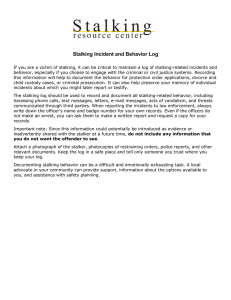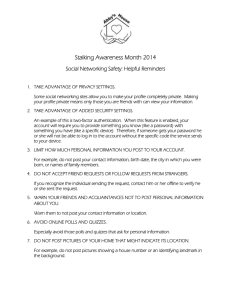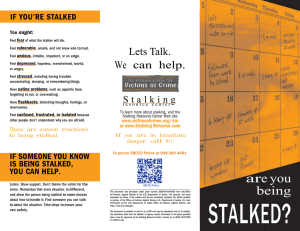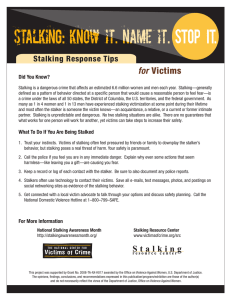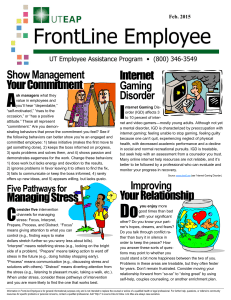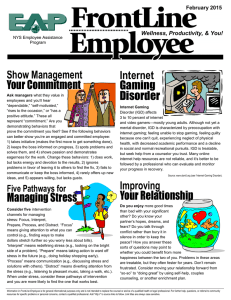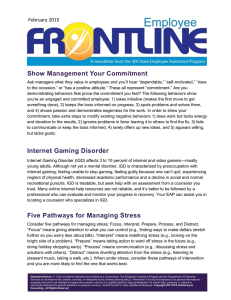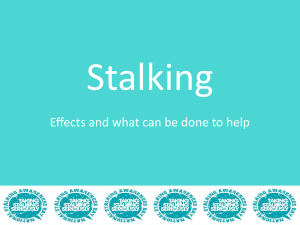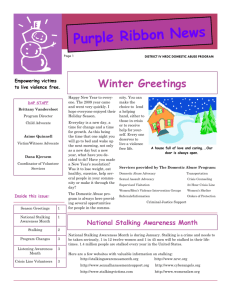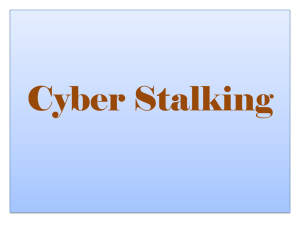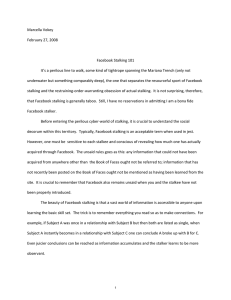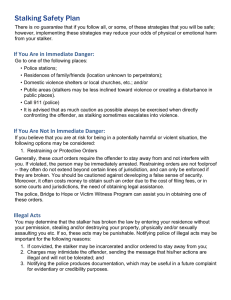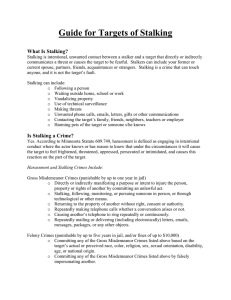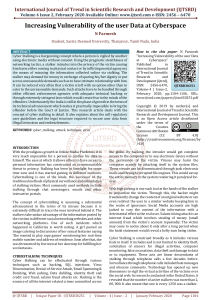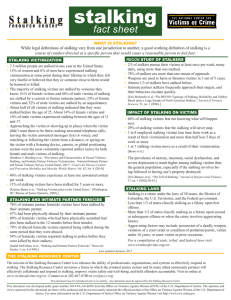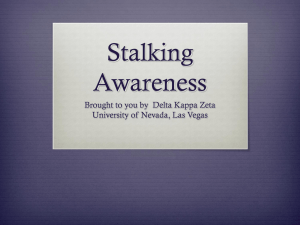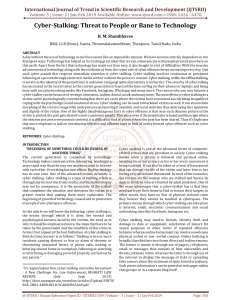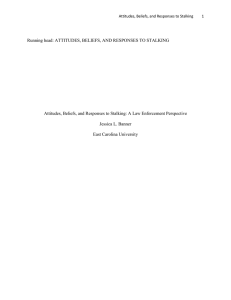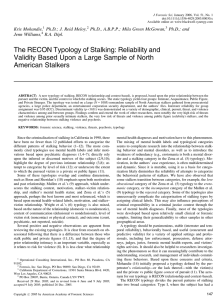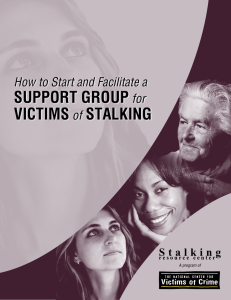Are you being stalked?
advertisement
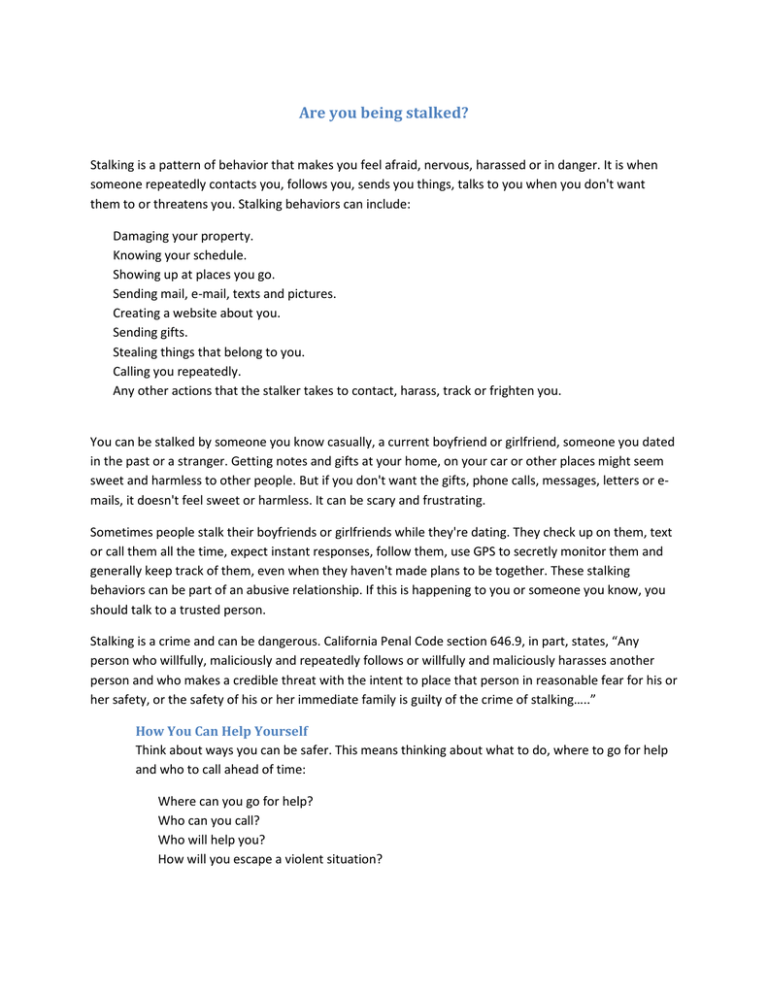
Are you being stalked? Stalking is a pattern of behavior that makes you feel afraid, nervous, harassed or in danger. It is when someone repeatedly contacts you, follows you, sends you things, talks to you when you don't want them to or threatens you. Stalking behaviors can include: Damaging your property. Knowing your schedule. Showing up at places you go. Sending mail, e-mail, texts and pictures. Creating a website about you. Sending gifts. Stealing things that belong to you. Calling you repeatedly. Any other actions that the stalker takes to contact, harass, track or frighten you. You can be stalked by someone you know casually, a current boyfriend or girlfriend, someone you dated in the past or a stranger. Getting notes and gifts at your home, on your car or other places might seem sweet and harmless to other people. But if you don't want the gifts, phone calls, messages, letters or emails, it doesn't feel sweet or harmless. It can be scary and frustrating. Sometimes people stalk their boyfriends or girlfriends while they're dating. They check up on them, text or call them all the time, expect instant responses, follow them, use GPS to secretly monitor them and generally keep track of them, even when they haven't made plans to be together. These stalking behaviors can be part of an abusive relationship. If this is happening to you or someone you know, you should talk to a trusted person. Stalking is a crime and can be dangerous. California Penal Code section 646.9, in part, states, “Any person who willfully, maliciously and repeatedly follows or willfully and maliciously harasses another person and who makes a credible threat with the intent to place that person in reasonable fear for his or her safety, or the safety of his or her immediate family is guilty of the crime of stalking…..” How You Can Help Yourself Think about ways you can be safer. This means thinking about what to do, where to go for help and who to call ahead of time: Where can you go for help? Who can you call? Who will help you? How will you escape a violent situation? Other Things You Can Do Let friends or family members know when you are afraid or need help. Be aware of your surroundings. Knowing where you are and who is around you may help you to find a way to get out of a bad situation. Avoid isolated areas. Avoid putting headphones in both ears so you can be more aware of your surroundings. Trust your instincts. If a situation or location feels unsafe or uncomfortable, remove yourself. Vary your routine, your driving routes and where you park your car. When you go out, tell someone where you are going and when you'll be back. In an emergency, call 911 or your local police department. Memorize the phone numbers of people to contact or places to go in an emergency. Don’t load yourself down with packages or bags restricting your movement. Keep your cell phone handy; check to see that you have reception and that your cell phone is charged. Have money for a cab or other transportation. Save notes, letters or other items that the stalker sends to you. Keep a record of all contact that the stalker has with you; these items will be very useful in an investigation. How You Can Help Someone Else If you know someone who is being stalked, you can: Encourage your friend to seek help. Be a good listener. Offer your support. Ask how you can help. Educate yourself about stalking. Avoid any confrontations with the stalker; this could be dangerous for you and your friend. Excerpt taken from CSU Sexual Violence Prevention and Education Statement (including facts and myths) [May, 2012].
